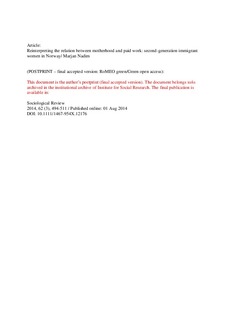Reinterpreting the relation between motherhood and paid work: second-generation immigrant women in Norway
Peer reviewed, Journal article
Accepted version
Permanent lenke
http://hdl.handle.net/11250/2462592Utgivelsesdato
2014Metadata
Vis full innførselSamlinger
- Publikasjoner fra CRIStin [715]
- Tidsskriftpublikasjon [388]
Sammendrag
A pertinent question in contemporary Europe is whether the children of immigrants will reproduce the gender-complementary practices and ideals of the immigrant generation, which often include strong expectations that women should prioritize family obligations over the pursuit of paid work.This article analyses the cultural and moral understandings at stake in second-generation women’s reflections on and practices of combining motherhood and paid work, and explores the space for negotiating such understandings in the family. The study is based on in-depth interviews with second-generation women of Pakistani descent in Norway,and interviews with some of their husbands. The findings show that the moral understandings and practices of the parent generation are not merely passed on to the second generation; rather they are challenged and reinterpreted in ways that support mothers’ participation in paid work. The article argues that this change is facilitated by the cultural and institutional context that the Norwegian welfare state represents.
